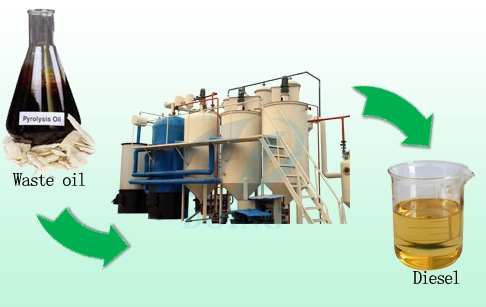In a world grappling with environmental concerns and a growing demand for energy, finding sustainable solutions to address both issues is paramount. One innovative approach gaining momentum is the conversion of waste oil into diesel fuel. This process not only reduces waste but also provides an eco-friendly alternative to traditional diesel production methods. In this article, we delve into the technology and benefits of converting waste oil into diesel fuel.
The Problem of Waste Oil
Waste oil, a byproduct of various industries and households, poses a significant environmental hazard when improperly disposed of. It is often contaminated with impurities and toxins that can harm the environment, including soil and water sources. Moreover, burning waste oil or disposing of it in landfills releases harmful emissions and contributes to air pollution. To address these issues, the conversion of waste oil into a valuable resource like diesel fuel waste oil to diesel machine become a promising solution.
The Conversion Process
The conversion of waste oil into diesel fuel involves a complex yet highly efficient process known as hydrotreating or hydrocracking. This process typically consists of the following key steps:
- Pretreatment: Waste oil is collected and subjected to preliminary filtering and purification to remove any solid contaminants and water.
- Hydrocracking: The pretreated waste oil is then heated and pressurized in the presence of a catalyst. This process breaks down the long-chain hydrocarbons in the waste oil into shorter, more valuable hydrocarbons, which are similar to those found in traditional diesel fuel.
- Fractional Distillation: The resulting product is subjected to fractional distillation, a process that separates the hydrocarbons based on their boiling points. This step ensures the removal of any remaining impurities and results in a high-quality diesel fuel.
- Post-Treatment: The distilled diesel fuel may undergo additional treatment processes to meet specific quality standards and regulatory requirements.
Benefits of Waste Oil to Diesel Conversion
Converting waste oil into diesel fuel offers numerous environmental, economic, and energy-related benefits:
- Reduced Environmental Impact: By recycling waste oil into diesel fuel, we reduce the environmental pollution associated with improper disposal methods. This helps protect soil, water, and air quality.
- Energy Independence: Waste oil to diesel conversion contributes to energy independence by reducing reliance on fossil fuels and promoting the use of alternative, sustainable energy sources.
- Resource Conservation: This process conserves valuable resources, as it utilizes waste materials to produce a valuable energy source, reducing the need for virgin crude oil extraction.
- Economic Opportunities: Waste oil to diesel conversion creates job opportunities in recycling and sustainable energy sectors, fostering economic growth.
- Lower Greenhouse Gas Emissions: Compared to traditional diesel production, the conversion of waste oil generates fewer greenhouse gas emissions, contributing to efforts to combat climate change.
Challenges and Considerations
While waste oil to diesel conversion offers numerous benefits, it also faces some challenges. These include the need for consistent waste oil feedstock quality, initial capital investment for the required equipment, and compliance with regulatory standards.
Moreover, it's important to ensure that the waste oil collection and conversion processes are carried out with strict adherence to environmental regulations to prevent any unintended negative consequences.
Conclusion
The conversion of waste oil into diesel fuel is a promising and sustainable solution to address both environmental concerns and the growing demand for energy. By recycling waste oil, we can reduce environmental pollution, promote resource conservation, and create economic opportunities. While there are challenges to overcome, the long-term benefits of this innovative approach make it a vital component of our efforts to build a greener and more sustainable future.


No comments yet